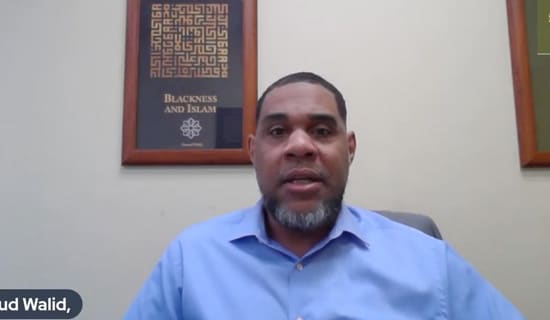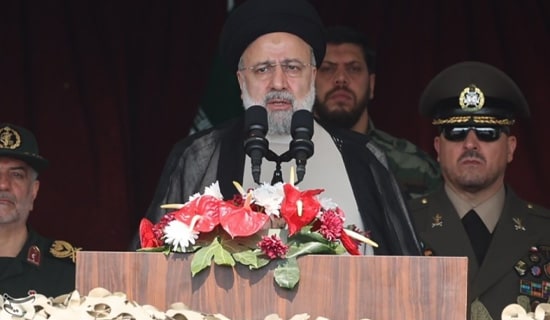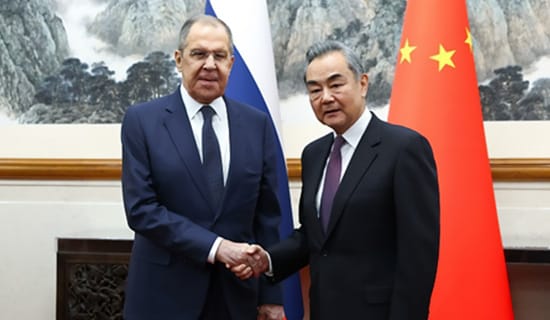On May 27, 2023 the European Palestinians Conference organization is scheduled to hold its 20th annual conference, in Malmo, Sweden. The conference will mark the 75th anniversary of the Palestinian Nakba and, like previous conferences held by this organization, will deal with the right of the Palestinian refugees to return to their homes, including within the state of Israel. [1] According to Israel and elements in the Palestinian Authority (PA), the European Palestinians Conference organization is affiliated with Hamas. [2]
The organization's annual conference, held each year in a different European city, focuses on the right of return.[3] It is regularly attended by Hamas members and supporters, such as Hamas Political Bureau head Isma'il Haniya, who has spoken at the conference several times.[4] According to Amin Al-Rashed, the organization's board chairman, this year's conference, titled "75 Years On.. We Will Return," is expected to be attended by some 20,000 Palestinians from all over Europe, and by European parliament members and other politicians.[5]
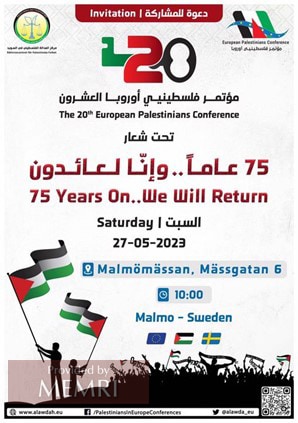
Announcement of the 20th European Palestinians Conference in Malmo, Sweden (facebook.com/Europeanpalestiniansconference, May 16, 2023)
PLO, Palestinian Authority (PA) and Fatah officials regard the Malmo conference as an attempt by Hamas to challenge the PLO's status as the sole legitimate representative of the Palestinian people, and have called to boycott it. The controversy over the conference has led to a wider debate about the PLO's current role in the PA and the diaspora. As part of this debate, former Palestinian information minister Nabil 'Amr published two articles in which he lamented the decline in the PLO's status over the years and stated that the dispute over the upcoming conference in Malmo is just a symptom of the deep problems that plague the PLO and its institutions.

European Palestinians Conference board chairman Amin Abu Rashed with Hamas leader Isma'il Haniya (Image: paltimes.ps, February 28, 212)
This report reviews the controversy among Palestinians over the Malmo conference, and presents excerpts from Nabil 'Amr's articles.
PLO Elements: Malmo Conference Is Organized By Hamas; Whoever Attends It Will Be Expelled From PLO
As stated, the upcoming 20th European Palestinians Conference sparked a controversy among Palestinians over the legitimacy of conferences held by Hamas-affiliated organizations in Europe about general Palestinian issues like the right of return. This debate is part of the deep dispute between the PA and Fatah on the one hand and Hamas on the other regarding the PLO's status as the sole legitimate representative of the Palestinian people. Hamas rejects the PLO's claim to be the representative of all Palestinians that is exclusively responsible for Palestinian activity abroad. In fact, it maintains that the PLO cannot be the Palestinians' source of authority at all until it enacts profound reforms that include holding elections to all its institutions, making changes to its political program and incorporating representatives of all the Palestinian organizations and factions, including Hamas and the Palestinian Islamic Jihad (PIJ). Until such reforms take place, Hamas demands to turn the Temporary Leadership Framework, of which it is a member,[6] into the Palestinian source of authority, a demand that Fatah sees as an illegitimate attempt to create an alternative to the PLO.
Against this backdrop, figures in the PLO, the PA and the PA's ruling party Fatah attacked Hamas and its supporters for holding the European Palestinians Conference in Malmo, presenting this as an attempt by Hamas to undermine the PLO's status and to replace it with a different body. The conference, they added, will harm the Palestinian cause as a whole and deepen the intra-Palestinian schism, and should therefore be boycotted.
Rawhi Fattouh, the chair of the PLO's Palestinian National Council (PNC) and a member of Fatah's Central Committee, warned that anyone attending the conference would be subject to Article 8 of the PNC charter, i.e., would be expelled from the PLO.[7] PLO Secretary-General Hussein Al-Sheikh said that the purpose of the conference is to divide the Palestinian communities abroad, which is "a red line we will not allow anyone to cross," and likewise warned that anyone attending it will bear the consequences specified in the PLO charter.[8]
Similar statements were made in articles in the PA press. 'Omar Hilmi Al-Ghoul, a columnist for the PA daily Al-Hayat Al-Jadida, wrote in an article titled "No to the Malmo Conference" that this conference is organized by Hamas, "the Palestine branch of the Muslim Brotherhood," and that it threatens the unity of the Palestinian lands, people and national cause. "Whoever really wants to defend the right of return," he added, "should immediately stop participating in Hamas' plan."[9]
Hamas figures responded with a harsh attack of their own. Hamas activist Mustafa Al-Lidawi said that the European Palestinians Conference empowers the Palestinians in Europe, who have been "forgotten and marginalized by their sources of authority," meaning the PLO. He condemned the "incitement" directed at the conference by those who have "neglected their people, disregarded its situation and abandoned it for many long years… while claiming to be its [only legitimate] representatives and source of authority."[10]
Hamas official Bassem Na'im addressed the opponents of the conference, saying: "I have a question for these [PLO] leaders: What threat is posed by this conference to our Palestinian cause and its principles or to our people and its aspirations? Why [are you attacking the conference] now, after [it has been convening annually for] 20 years?... What is keeping you from organizing similar activities, or even more effective ones, as part of fair competition and with your abilities and resources…?" Rejecting the accusation that Hamas seeks to replace the PLO, Na'im asked: "Is the PLO so weak and fragile that a popular conference… threatens its legitimacy and its existence?" He added: "Is the PLO really an alternative to a vital Palestinian society, with all Palestinians taking part, according to their abilities, in building a better future for our people? Or are you [merely] defending your personal profits and [Fatah's] partisan enterprises?" [11]
Amin Abu Rashed, board chairman of the European Palestinians Conference, likewise rejected the accusations of undermining the PLO, but at the same time noted that the PLO does not represent all Palestinians, saying: "[We have] no intention of eliminating [the PLO], disrupting its activity or marginalizing it. On the contrary, [we want] to reform it, so that it represents all the Palestinians."[12]
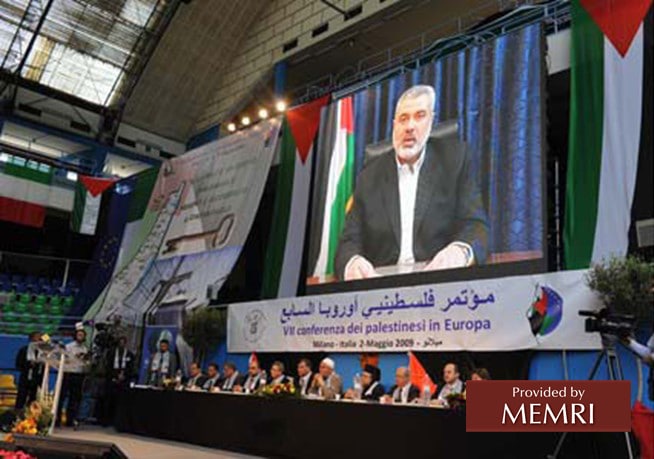
Hamas leader Isma'il Haniya speaking at the 2009 European Palestinians Conference in Milan (Image: Alawdaeu.prc.org.uk, May 9, 2009)
Former Palestinian Information Minister: The Controversy Over The Malmo Conference Is A Symptom of Profound Problems In PLO
As part of the public debate over the legitimacy of the conference in Malmo, former Palestinian information minister Nabil 'Amr, who held key positions in the PLO and the PA but who in recent years has frequently criticized their performance,[13] wrote two articles in which he lamented the erosion of the PLO's status over the years. In the first article, published in the Palestinian daily Al-Quds, he noted that the PLO, which was once a strong organization that enjoyed the support of all Palestinians and made many important achievements on behalf of the Palestinian cause, lost this status over the years and can no longer claim to be the representative of all Palestinians, especially in the diaspora. The younger generation, he said, barely knows this organization, while the older generation laments its sorry state, and the controversy over the upcoming conference in Malmo is just a symptom of the profound problems that plague this organization and its institutions.
In his second article, published in the London-based daily Al-Sharq Al-Awsat, 'Amr explained that the PLO, which was "the Palestinians' greatest achievement in their national struggle," once served as a unifying framework for all the Palestinian forces and led the Palestinian political and military action, but over the years it became a weak organization bereft of any influence. The reason for this, he argued, is that the PLO was subordinated to the PA, and was therefore affected by the negative developments in the PA, chiefly the intra-Palestinian schism and the deterioration of the relations with Israel, which undermined the PLO's status and even completement eliminated it.
Both articles implicitly criticize the fact that, for years, there have been no elections to the parliamentary institutions – the PLO's Palestinian National Council and the PA's Legislative Council – and argue that this has contributed to weakening the PLO and the PA. It should be noted that this criticism has been heard in recent years not only from 'Amr but also from other former Palestinian officials.[14]
SUPPORT OUR WORK


Nabil 'Amr (image: Alnasnews.com.jo)
The following are excerpts from 'Amr's articles.
During The PLO's Heyday, No Palestinian Wondered Who Represented Him; Today The PLO Has Essentially Fallen Apart
In his first article on this topic, published May 3, 2023 in the East Jerusalem-based Palestinian daily Al-Quds, 'Amr wrote: "If we conducted a professional and objective survey on the true state of the PLO and its presence in the life of the Palestinian people today – compared to the state of this organization when it was declared the sole legitimate representative of the Palestinian people at the [1973 Arab] Summit in Rabat, or when the great [chairman of the PLO], the late Yasser 'Arafat, gave the Palestine Speech at the UN General Assembly,[15] or when the PLO waged its longest struggle against Israel and was expelled from Lebanon [in 1982] but consolidated its political presence throughout the world… – the findings of the [present] survey would be as follows, although I sincerely hope I am wrong:
"--The young generation, born and raised in the last 25 years, knows little about the PLO.
"--The older generation, which established the PLO and was party to its most important achievements, [now] speaks sadly about the state [ of this organization], as though it is generally on its way out – and I am not referring to the state of the PLO members, but to the state of its institutions, which were the basis of its success and of its power and presence, but are now barely present, except in headlines and in remembered stories.
"--Those who live in the homeland think that the PLO is hiding behind the PA, which is itself hiding behind its unresolved crises, behind the political stalemate, the ongoing [Palestinian] schism and the undermining of the attempts to address it.
"--Those living outside the homeland are preoccupied with the big question: Where are we and what is our role? Where is the PLO of the old days, which united all the Palestinians, regardless of their political views?...
"In the past, no Palestinian asked 'who represents me?' or 'who is leading my national struggle?' or 'who speaks on my behalf in every forum?' The PLO, which was strong and inclusive, was the convincing answer to all these questions. The PLO had presence thanks to its popularity and its [ability to] unite all the Palestinians, whether [they lived] thousands of miles away from Palestine or in the heart of the homeland. This presence was not just thanks to the media, to [the PLO's] funds or even to the [Palestinians'] strong need for a collective national identity… It was based on [the organization's] convincing achievements as the leader of the [Palestinian] people. [These achievements] proved the PLO worthy and established the Palestinian cause as worthy of being the main cause of the Arab and Islamic world and of all the peoples who aspire to freedom, justice and the right to self-determination…
"The question is, where is the PLO and this [ability] to unite people behind it [today]? And where are its institutions? Where is its presence in the homeland and wherever Palestinians live? Where is its old [ability to] incorporate all the elements and factions – even opposition factions –and unite them behind its [political] plans? Where is the national unity? I am not talking only about unity between Fatah and Hamas, or between Gaza and the West Bank, or between the PA and the public. The PLO has fallen apart, and its blood has been spilled among the various tribes that are [now] fighting over the crumbs.
"Egypt has given up and so has Algeria, and this is after Yemen, Saudi Arabia, Russia and everyone else also gave up on ending the schism dividing the single [Palestinian] people and the single [Palestinian] homeland. Today nobody is trying. In fact, nobody is even talking about ending the schism, and every day that passes without a solution brings us closer to [permanent] division.
"Using the glorious achievements of the past to fill up the vacuum of the present will not do us any good. The solution to the [sorry] state of the PLO, in terms of its presence, its role, its influence and its future, can be found only in the homeland. As for [the dispute over the upcoming conference in] Malmo, Sweden, it is just another in a chain [of disputes] stemming from the weakness of the center [i.e., the PLO]…"[16]
The PLO Was Subordinated To PA And Therefore Affected By Its Crises; The Palestinian Schism Has Reached Even The Diaspora
In his second article on this topic, published May 5 in the Saudi daily Al-Sharq Al-Awsat, 'Amr wrote: "The Palestinians' greatest achievement in their national struggle – at least in the era of the Palestinian revolution and the armed factions – is the PLO, which was proclaimed the sole legitimate representative of the Palestinian people at the [Arab] summit in Rabat… The PLO led the Palestinian national action for decades as a unifying framework incorporating all the forces. It waged long struggles to survive and to maintain its political representation, until it was [recognized] by the world as the exclusive element to be addressed in any Palestinian matter. It led [both] the fighting and the political action, and in the last third of its history it led what had initially seemed impossible: direct negotiations with Israel and recognition of its right to exist in secure and recognized borders. The PLO established the [Palestinian] National Authority. Although there was serious opposition to its joining the Oslo negotiations, it made considerable progress towards achieving an arrangement it hoped would lead to the establishment of an independent state, while negotiating the so-called 'permanent settlement issues,' chief of them the issue of the refugees…
"Even after [the signing of the] Oslo [Accords], the PLO continued to function as the leading framework in the general Palestinian arena. The PA, established [by the PLO], was just one of the platforms [for its activity] and one of its national components… at least on paper. But in reality, because all the resources were channeled to the PA, which enjoyed extensive political, financial and international support, and after the leadership – especially Yasser Arafat and all the factions subordinate to the PLO – returned to the homeland, the PLO essentially became subordinate to the PA. Instead of being a permanent strategic asset of the [Palestinian] cause, the PLO became part of the PA. Even its budget was allocated, and is still allocated, by the PA Finance Ministry… This had a negative political impact, [because] all the problems of the PA, of the political process and of the relations with Israel affected the PLO as well, marginalizing and even completely canceling its role as the supreme leader [of the Palestinian arena].
"What happened to the PLO on the domestic level was even worse. The [faction of] political Islam [i.e., Hamas] steadily grew, and refused to join the PLO, out of pride. Many [other] factions, especially the leading ones, likewise refused to take part in its frameworks and institutions. Thus, for the first time in the history of the [Palestinian] cause and revolution, there is ongoing division – deep, broad and very dangerous. Two [governments] are [claiming] legitimacy: one of them [i.e., the PA] [claims legitimacy] based on the constitution.[17] This is [the government] recognized by the world, which is based in Ramallah and headed by Mahmoud 'Abbas. The other [i.e., Hamas government], based in Gaza, claims legitimacy based on a fait accompli [i.e., the 2007 coup in Gaza], and the world cooperates with it. [This situation] affects not only the PLO and its leading status but the situation in Palestine as a whole. [Moreover,] this overt and covert division has spread… to the Palestinians in the diaspora, who have called to hold various conventions under various names, incurring criticism from the [PA] authorities in Ramallah and support from the fait accompli authorities [i.e., Hamas] in Gaza. This means that the division has spread and contaminated the Palestinian reality and all its components, in the homeland and the diaspora.
"So what must be done? If all the components of the Palestinian political echelon had recognized the PLO's importance, they would have vied to join this organization without preconditions. The PLO, from its inception, has never forbidden differences of opinion regarding the national cause. It served as a unifying framework that regulated these differences and prevented them from developing into rifts and schisms… If the Palestinian political echelon had realized that governing by imposing one approach and eliminating the others is impossible, the division would not have lasted a single day, and not a single faction would have left the PLO. Because, in addition to functioning as a unifying framework, the PLO is the safest place that protects everyone, especially in times when everyone is facing the same danger.
"Sadly, we are now experiencing a verbal war that is as dangerous as an armed war. The PLO, with its active frameworks, is the one that protected the Palestinian [cause] from danger in the past, and it has the means to protect it from danger in the future. Will the [Palestinians], divided between the West Bank, Gaza and Malmo, understand this?"[18]
[1] Facebook.com/Europeanpalestiniansconference, April 27, 2023.
[2] Based in London, the European Palestinians Conference organization incorporates several Europe-based Palestinian associations. It was established by the Palestinian Return Centre, which was designated by Israel in 2010 as an illegal association serving as an arm of Hamas. Although it describes itself as "a platform for all Palestinians," the conference is clearly aligned with the positions of Hamas and the Muslim Brotherhood. Officials in the European Palestinians Conference organization, including its board chairman, Amin Abu Rashed, are known to have ties to Hamas (see e.g., paltimeps.ps, February 28, 2012).
[3] The conference's website states that it was established "after the idea of waiving the right of return came up in the negotiations over the so-called final settlement." Its purposes is "to affirm that the right of the Palestinians to return to their homes and lands… is absolute and cannot be reduced to humanitarian aspects, and should be at the core of all the Palestinian and Arab action in order to protect the Palestinian people and guarantee their legitimate inalienable rights" (alawdah.eu, April 9, 2023).
The first European Palestinians Conference was held in London in 2003 under the slogan "We Will Never Relinquish the Right of Return" (alawdah.eu, April 30, 2003). In addition to holding the annual conference, the organization holds demonstrations, rallies and activities in Europe stressing the right of the Palestinian refugees to return to their homes throughout Israel and challenging Israel's legitimacy.
[4] Haniya spoke, for example, at the 2007 conference in the Netherlands, in the 2008 conference in Denmark, and in the 2009 conference in Italy (aljazeera.net, May 5, 2007, May 4, 2008, aladaeu.prc.org.uk. May 9, 2009). Conversely, Palestinian Authority President Mahmoud 'Abbas has never attended the conference.
[5] Aljazeera.net, May 20, 2023.
[6] The intra-Palestinian reconciliation agreement signed in Egypt in 2005 called for the establishment of a committee comprising the PLO leadership and the heads of all the Palestinian factions (including those that are not part of the PLO) in order to "activate and develop" the PLO (info.wafa.ps, March 17, 2005). Subsequent reconciliation agreements between Fatah and Hamas stated that this committee would serve as a "temporary leadership framework" until the holding of elections to the PLO's Palestinian National Council. See MEMRI Inquiry & Analysis Series No. 699 - The Fatah-Hamas Reconciliation: Was There an Agreement? – June 24, 2011. However, the various reconciliation agreements were never implemented, and elections were not held. The committee of faction leaders, or "temporary leadership framework," convened only once, in 2020, for a formal meeting chaired by 'Abbas and attended by low-level representatives from Hamas and the PIJ. See Special Dispatch No. 8932 – Arabs Attack Palestinian Leadership Following Its Harsh Denouncement Of UAE-Israel Normalization Agreement: The Palestinian Cause Is Defunct; The Palestinians Must Face Reality, Stop Their Ingratitude Towards The Gulf States, September 14, 2020.
[7] Wafa.ps, April 30, 2023.
[8] Wafa.ps, April 30, 2023.
[9] Al-Hayat Al-Jadida (PA), April 30, 2023.
[10] Facebook.com/elleddawi.moustafa, May 5, 2023.
[11] Facebook.com/basem.naim.1, May 1, 2023.
[12] Palinfo.com, May 1, 2023.
[13] Among the positions 'Amr held were: head of the PLO's radio station Voice of Palestine, PLO representative in the Soviet Union and later in Russia, founder of the PA daily Al-Hayat Al-Jadida, advisor to PA presidents Yasser Arafat and Mahmoud 'Abbas, member of committees involved in negotiations with Israel, member of the PA Legislative Council on behalf of Fatah, PA information minister and minister of parliamentary affairs, and Palestinian ambassador to Egypt and to the Arab League.
[14] See MEMRI reports: Special Dispatch No. 10540 – Former Palestinian Authority Minister: We Shouldn't Gloat Over The Demonstrations In Israel – Our Situation Is No Better , March 27, 2023; Special Dispatch No. 10439 – Former Palestinian Minister: The Palestinians Should Learn From The Public Protest In Israel Against Judicial Reform – And Demand Their Right To Democracy And Rule Of Law, January 25, 2023; Special Dispatch No. 8405, Palestinian Former Minister: We Have State Institutions And Symbols, But We Have Failed To Consolidate A Real State, Anchored In Democracy And Rule Of Law, Which Benefits The Citizens, December 11, 2019; Special Dispatch No. 8233 – Former Palestinian Authority Minister Criticizes Palestinian Leadership: There Is A Rift And Mistrust Between The Palestinian People And Its Leaders Who Fail To Keep Their Promises, August 20, 2019.
[15] The reference is to the precedential speech delivered by Arafat before the General Assembly on November 13, 1974, following which the PLO was granted observer status at the UN. In this speech Arafat denied Israel's right to exist and proposed a "peaceful" solution in which Israel would essentially relinquish its sovereignty. He called to grant the Palestinians sovereignty and a right to self-determination, and threatened that, otherwise, the terror and armed struggle would continue. He ended his speech with the dramatic declaration that he had come to the UN bearing an olive branch in one hand and a freedom fighter's gun in the other (un.org/unispal/document/auto-insert-187769).
[16] Al-Quds (East Jerusalem), May 3, 2023.
[17] It should be noted that the PA governs through presidential decrees and without holding elections, in contravention of its constitution. See MEMRI reports: Inquiry & Analysis Series No. 1644 - Following Rumors That Palestinian President Mahmoud Abbas Is Ill, Palestinians Continue To Call For Establishing Arrangement For Transfer Of Power To New President – July 18, 2022; Special Dispatch No. 9981 - Palestinian Political Commentator: For Hamas And Fatah, Elections Are A Means To Power – Not Part Of A Democratic Process – May 24, 2022; Special Dispatch No. 9726 – Former Palestinian Minister: The West Bank Is In Chaos; Palestinian Authority Has Failed To Build Properly Governed Lawful State, January 18, 2022; Special Dispatch No. 9489 - Palestinian Politicians, Journalists Slam Fatah: It Has Transformed From A Liberation Movement Into A Militia Suppressing All Legitimate Criticism Of Palestinian Authority – August 10, 2021; Special Dispatch No. 9426 - Palestinian Journalists, Politicians Lambaste Palestinian Authority For Death Of Political Dissident At Hands Of Security Apparatuses: This Misconduct Reflects Profound Problems Requiring Comprehensive Reform – July 2, 2021; Inquiry & Analysis Series No. 1571 - Palestinians Concerned That Israeli Ban On Holding Palestinian Authority Elections In East Jerusalem Will Serve Fatah As Excuse To Cancel Elections – April 13, 2021; Inquiry & Analysis No. 1564 - New Decrees By Palestinian Authority President 'Abbas Restrict Civil Society – March 15, 2021; Special Dispatch No. 8405 – Palestinian Former Minister: We Have State Institutions And Symbols, But We Have Failed To Consolidate A Real State, Anchored In Democracy And Rule Of Law, Which Benefits The Citizens, December 11, 2019; Special Dispatch No. 8233 – Former Palestinian Authority Minister Criticizes Palestinian Leadership: There Is A Rift And Mistrust Between The Palestinian People And Its Leaders Who Fail To Keep Their Promises, August 20, 2019; Inquiry & Analysis Series No. 1433 - Fatah-Hamas Schism Widens Further Following Ruling By Palestinian Authority Constitutional Court – Established By Palestinian Authority President 'Abbas – To Disband Palestinian Legislative Council – January 22, 2019; Inquiry & Analysis No. 1401, Calls In Palestinian Authority For Arranging Mechanism For Transfer Of Power Following Palestinian Authority President 'Abbas's Hospitalization, June 11, 2018.
[18] Al-Sharq Al-Awsat (May 5, 2023).


